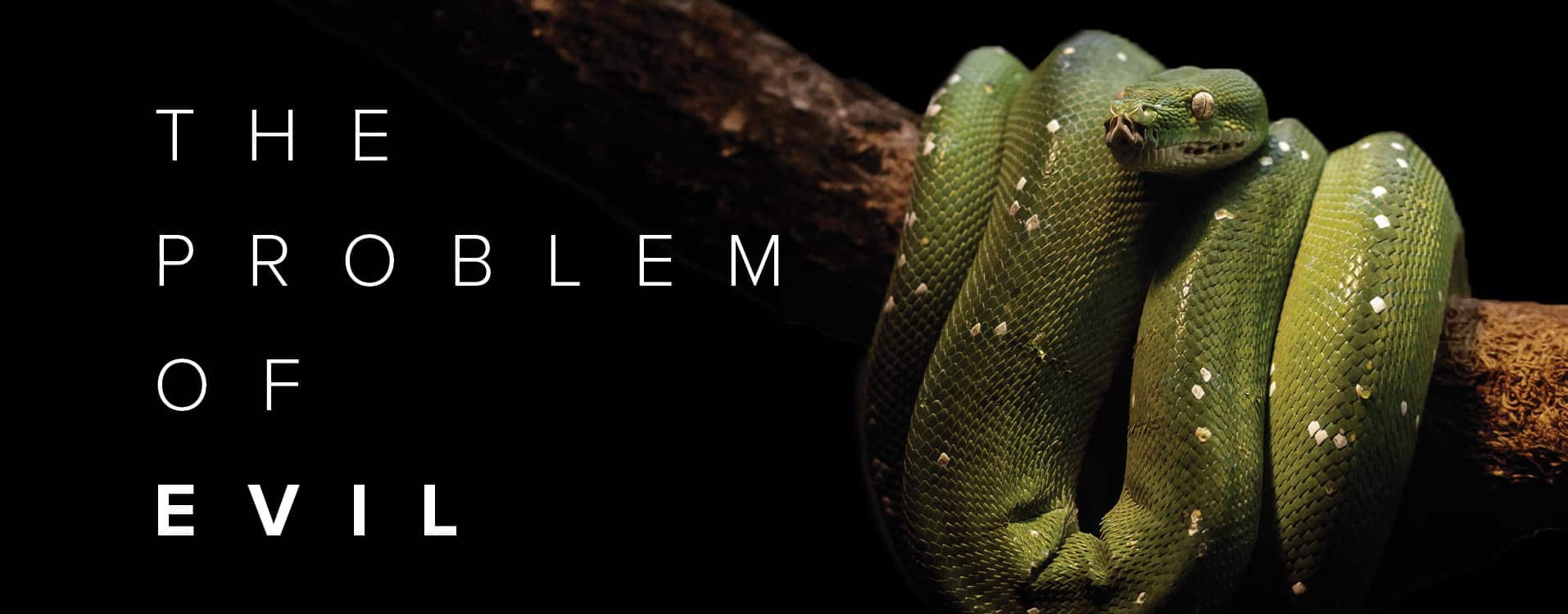Did God Create Evil?
I like watching kid’s movies. There is no stress involved in watching kids movies. I can pretty much figure out the major plot lines in the first 5 minutes of of any kids movie. Sometimes just by seeing the title. For the most part, the good guys are going to win and ultimately the bad guys are going to get theirs in the end. I hope I’m not ruining the movie for you but I just know the Rugrats are going to make it home. So too, Woody and Buzz. I know that despite some hardship and struggle that the bad guys will be foiled and the good guys somehow will be able to “Free Willy.” I’ve never seen the movie, I’m just guessing here. I know that Aladdin will make the right choice in the end. Sure he’ll be tempted by fame and riches and a great wardrobe, but he will free the genie be it Robin Williams or Will Smith. I know that they wouldn’t call it the incredible journey if the cat got weakened by worms and then mauled by a bear. It doesn’t work that way. In kids movies Superman narrowly escapes the krimptonite and defeats Lex Luthor, the wet bandits get hit in the face with paint cans and hot irons, Batman solves the riddler, Dick Tracy gets prune face, the Stay Puft Marshmallow man explodes and the witch melts.
I love kids movies. I got on several airplanes last year and among the movies I watched on those planes were Aladdin, Toy Story 4 and Inside Out. I may or may not have cried during each of those movies.
When we go to the movies we want to see the good guy win and the bad guy lose. That doesn’t change as adults. We want to see the terminator terminated and the aliens alienated and Darth die. We want the Good to beat the bad and the ugly. Unfortunately the scrip in life is not as predictable. The bad guys demise is not so sure. Too many times in life the bad guys win and the good guys lose and we are left sitting in the bleachers wondering why. And ultimately that question ends up at the feet of God.
Illustration: 3 reasons why we need to avoid judging
It was F. B. Meyer, I believe, who once said that when we see a brother or sister in sin, there are two things we do not know: First, we do not know how hard he or she tried not to sin. And second, we do not know the power of the forces that assailed him or her. Third, we also do not know what we would have done in the same circumstances.
Stephen Brown, Christianity Today
John Paul Getty
The richest man in the world is a perfect example of how you can have great success in business and yet still be a miserable failure at life.
The following article from People magazine details a life that exemplifies why the evil, upon further review, don’t really succeed.
“On a clifftop overlooking Los Angeles, the $1 billion dollar Getty Center attracts 15,000 daily and has been lauded as a shrine to high culture. Yet the saga of the Getty family is more soap than opera. Splintered over generations of divorce, drug addiction and suicide, the Getty’s became a scattered string of alienated relatives too dysfunctional to be called a dynasty. A lifelong philanderer Getty had 5 wives who bore him 5 sons, none of whose weddings he attended. Getty’s softest spot was reserved for his son Timmy, his last child. Yet when the boy died of a brain tumor in 1958 at the age of 12, Getty, on business in Italy, did not return for the funeral. His son George, who addressed his father as Mr. Getty, died after consuming a massive blend of pills. His third son, Jean Paul, married 3 times, losing his second wife to a heroin overdose. When Getty’s oldest grandson was kidnapped in 73, Getty, fearful that his other grandchildren would also become targets, the billionaire oil baron refused to cough up the ransom for five months at which point the kidnappers hacked off 16 year old Jean Paul the third’s ear and mailed it to a Rome newspaper. The boy was released only after Getty grudgingly loaned the child’s father, his third son, part of the ransom at 4% interest. His life was like a series of business transactions in which his wives and children were loose change. He was a genius at business, but an illiterate with respect to intimacy and family.
Matthew 5: 43-47 “You have heard that it was said, `Love your neighbor and hate your enemy.’ But I tell you: Love your enemies and pray for those who persecute you, that you may be sons of your Father in heaven. He causes his sun to rise on the evil and the good, and sends rain on the righteous and the unrighteous. If you love those who love you, what reward will you get? Are not even the tax collectors doing that? And if you greet only your brothers, what are you doing more than others? Do not even pagans do that?
David Rocker was the opposite. He was a journeyman defensive lineman holding onto his roster spot by the skin of his teeth. Outwardly he was not a big success, but inwardly he had peace and contentment from his relationship with Jesus Christ. He frequently shared his faith and at first avoided Sean Gilbert. Rocker says “I stayed clear of Sean. The only time our paths crossed was in the locker room when you could smell him reeking of alcohol.”
All that changed one night. Rocker recieved a phone call that night and heard the caller identify himself as Sean. The last name Gilbert never crossed his mind. But this was really Sean Gilbert on the telephone seeking his help and the most intimidating player on the Ram roster was crying and asking to turn his life around. Now David Rocker had a choice. He could rejoice in his suffering. He could bring out the yardstick. But that is not what we are called to do. Rocker says “When I realized how bad off he was I jumped into my truck and drove over to his home. That night he became reborn.”
Just like that-overnight. The last night Sean Gilbert took a drink. No more parties, strip joints or substance abuse. His wife says “One day he’s the old Sean and the next day he’s different, the difference being God just showed up.” The next day Gilbert was standing before his teammates and “they were looking at me like I was crazy,” says Gilbert. “A day earlier, I’m cussing and drinking and carrying on, and now I was talking about being saved.”
For Rocker, it was more than a night never to be forgotten. He was cut a few weeks later. But he believes he was brought to the Rams for a higher calling. “I played a major role in this guy’s life. The Lord needed me in Anaheim for this one reason–to help Sean Gilbert. The fact that I had some impact on this man’s3 life is as important as anything I can accomplish in football.”
Cross, the Overcomer of Evil
[God] is not the author of evil, but he is the author of creation and of the risk inherent in it.… The significance of the cross of Jesus is that the one who suffers most because of sin is not mankind but God himself and it is by his own action in the cross that the power of evil is actually overcome.
The Satan Syndrome, Nigel Wright, Zondervan, 1990, p. 68
Evil The Misuse of God-Given Freedom
Evil is the product of the misuse of God-given freedom and that the possibility that free beings might choose evil rather than good is a necessary part of human freedom .As it is logically impossible for God to create a free being who automatically does what is right (in this case there would be no freedom) he has therefore introduced into the creation a freedom which is neither conditioned nor predetermined .he has chosen to create a world in which there are free creatures because it is the best possible way towards the kind of people God ultimately desires .God is omnipotent, omniscient and wholly good but that it was not within God’s power to create a world containing moral good without creating one containing the possibility of moral evil. The risk of evil is therefore a necessary part of free existence and is incompatible with neither the power nor the love of God.
The Satan Syndrome, Nigel Wright, Zondervan, 1990, pp. 81-2
Greatest Evil
As C.S. Lewis wrote,
“The greatest evil is not done in those sordid ‘dens of crime’ that Dickens loved to pain. It is conceived and moved, seconded, carried, and minuted in clean, carpeted, warmed, and well-lighted offices, by quiet men with white collars and cut fingernails and smooth-shaven cheeks who do not need to raise their voices.”
Against the Night, Charles Colson, p. 46
.
Agnostic Farmer
The story is told of a farmer in a Midwestern state who had a strong disdain for “religious” things. As he plowed his field on Sunday morning, he would shake his fist at the church people who passed by on their way to worship. October came and the farmer had his finest crop ever—the best in the entire county. When the harvest was complete, he placed an advertisement in the local paper which belittled the Christians for their faith in God. Near the end of his diatribe he wrote, “Faith in God must not mean much if someone like me can prosper.”
The response from the Christians in the community was quiet and polite. In the next edition of the town paper, a small ad appeared. It read simply, “God doesn’t always settle His accounts in October.”
The Heart
If only there were evil people somewhere insidiously committing evil deeds, and it were necessary only to separate them from the rest of us and destroy them. But the line dividing good and evil cuts through the heart of every human being. And who is willing to destroy a piece of his own heart?
Aleksander Solzhenitsyn in The Gulag Archipelago.






Leave A Comment